| |
| |
Photographer,
Location |
Images |
Comments |
|
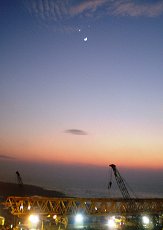
|
Ulhas Deshpande,
Mumbai, India
Dec. 1, 2008 |
#1,
#2,
#3,
#4 |
After the terrorist
attack, Mumbaikars were grieving their friends who
passed away. This apparition in the heavens came as
a blessing and encouraged them to carry on. The photos
were taken from the Worli Seaface.
|
|
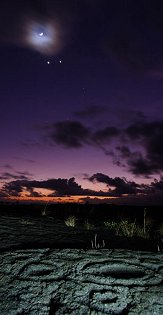
|
Stephen O'Meara,
Pu'uloa Lava fields, Big Island, Hawaii
Dec. 1, 2008 |
#1,
#2,
|
A triad of celestial orbs looms over a similar arrangement of mysterious orbs carved in the ancient Pu'uloa lava fields of Kilauea Volcano. Some petroglyphs, like these, may have may astronomical significance.
|
|
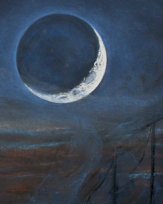
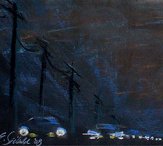
|
Mark Seibold,
Central Portland Oregon
Nov. 30, 2008 |
#1,
more |
As I drove west from the east of Portland, the most
amazing sky scene evolved. Many people think of a
photographic Kodak moment produced in a camera but
the aesthetics of this fast changing scene could not
be done in a still photo for me as I was thinking
pastel sketching from scratch. I hurried home to grab
my portable Nexstar 5i telescope and art supplies,
rushing to a hilltop in central Portland, the moon
now sinking into the fog. I quickly captured the lunar
terminator in a quick sketch from the eyepiece with
poor seeing conditions. I roughed in the image and
the positions of Jupiter and Venus, leaving the foreground
open for a landscape to add the moon illusion perspective
to show its stark size. Returning home I rendered
the scene as I recalled from driving just earlier,
the fog forming was like smoke rising in front of
the street filled with traffic, yet the sunset was
still beaming though in a fiery orange below. Above
the moon and planets floated in an ethereal cool blue
mist. –Mark Seibold, Artist-Astronomer, Portland Oregon
|
|
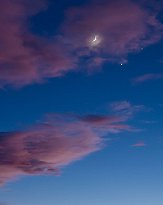
|
Steve Zimmermann,
Boulder, Colorado, USA.
Dec. 1, 2008 |
#1,
#2,
more |
We had overcast
skies on Sunday, but at sunset on Monday there were
just a few beautifully lit wave clouds (alto cumulus
standing lenticular, to be precise) to set off the
conjunction. Spectacular!
Photo details: Canon
EOS 5D, EF 24-105mm zoom lens for the first shot;
EF 70-200mm f/2.8 for the second shot. |
|
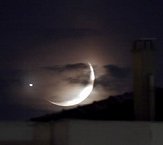
|
Serdar Hepgul,
Istanbul, Turkey
Dec. 1, 2008 |
#1,
#2 |
Photo
details: Canon
EOS 5D, Takahashi 60, 1-3 sec exposures. |
|
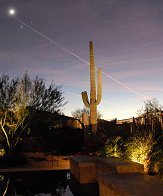
|
Savannah O'Brien,
Goodyear, Arizona, USA
Dec. 1, 2008 |
#1,
#2,
#3,
#4 |
There were wispy
clouds just after sunset, which is common for Winter
in Arizona. At first, I wasn't too pleased about the
contrails getting in the way, but when one split Jupiter
and Venus, I thought it was neat. Once it got dark,
it was even more dramatic in my back yard. My husband
had recently installed foot lights for the Saguaro
cacti, and it made all the difference for photographing
last night's event.
Photo
details: Nikon
D200 |
|
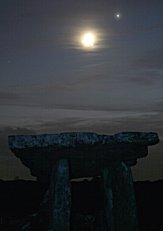
|
Frank Ryan Jr,
The Burren, Co. Clare, Ireland.
Dec. 1, 2008 |
#1,
#2,
#3,
#4,
more |
What an awesome
thing it was to see a conjunction like this from such
an ancient site. You can easily understand the power
this kind of celestial event could have over our ancestors.
Photo
details: Canon
350D, Meade
ETX-125 OTA |
more
images: from
Mike Corn of Antonino, Kansas; from
Tom McIntyre of Central Park, New York City; from
Matt of Tampa, Florida; from
Duke Johnson of Delicate Arch, Arches National Park,
Utah; from
Stephanie LaRose of Poughkeepsie, New York; from
Larry Fischer of Topeka, Kansas; from
Phil Harrington of Upton, NY; from
Paulo de Tarso of Sao Paulo, Brazil; from
Sandeep Sahijpal of Chandigarh, India; from
LeRoy Zimmerman of Fairbanks, Alaska;
|
|